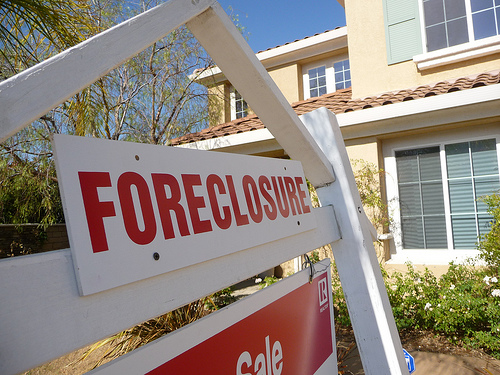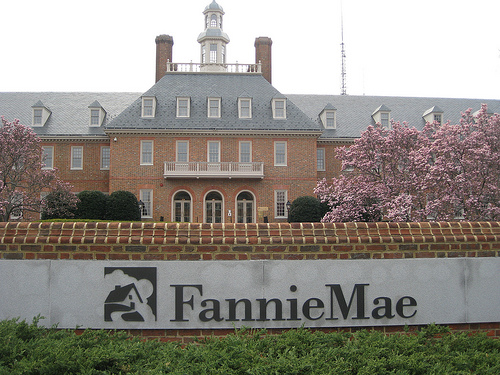
<a href="http://www.flickr.com/photos/respres/2539334956/sizes/m/in/photostream/">respres</a>/Flickr
When it comes to the mortgage fraud fiasco, the federal government has a message for the nation’s biggest banks: You’re not out of the woods yet.
The Federal Housing Finance Agency (FHFA), which oversees housing giants Fannie Mae and Freddie Mac, is prepping lawsuits against more than a dozen large banks for allegedly deceiving the government on the quality of mortgage securities that the banks peddled during the housing bubbble, the New York Times reports. Those banks include JPMorgan Chase, Goldman Sachs, Deutsche Bank, and Bank of America, the nation’s largest banking institution.
At the crux of the suits is this: The banks, which put together the securities using piles of home loans and later sold huge amounts of these securities to Fannie and Freddie, failed to properly vet the quality of the loans and missed evidence of falsified borrower income figures. In short, the feds say, the banks didn’t do their homework as required by securities law.
Fannie and Freddie—that is to say, the taxpayers—lost $30 billion partly because of these disastrous securities deals, according to the Times
Here’s more:
The impending litigation underscores how almost exactly three years after the collapse of Lehman Brothers and the beginning of a financial crisis caused in large part by subprime lending, the legal fallout is mounting.
Besides the angry investors, 50 state attorneys general are in the final stages of negotiating a settlement to address abuses by the largest mortgage servicers, including Bank of America, JPMorgan, and Citigroup. The attorneys general, as well as federal officials, are pressing the banks to pay at least $20 billion in that case, with much of the money earmarked to reduce mortgages of homeowners facing foreclosure.
And last month, the insurance giant American International Group filed a $10 billion suit against Bank of America, accusing the bank and its Countrywide Financial and Merrill Lynch units of misrepresenting the quality of mortgages that backed the securities AIG bought.
Bank of America, Goldman Sachs and JPMorgan all declined to comment. Frank Kelly, a spokesman for Deutsche Bank, said, “We can’t comment on a suit that we haven’t seen and hasn’t been filed yet.”
As Yves Smith points out, the suits aren’t a surprise; FHFA chief Ed DeMarico has been eyeing such litigation for more than a year. But they come at a difficult time for the banks and the housing industry.
There’s the massive state attorneys general settlement on the way. Then there’s New York Attorney General Eric Schneiderman, a favorite of consumer advocates who was kicked off the committee spearheading the mortgage settlement, who has said he’ll seek to press on with fraud investigations of his own regardless of how the settlement comes out. And there are those pesky reporters who continue to dig up instances of foreclosure fraud, reporting that suggests that while banks had promised to correct fraudulent practices, in some cases they’ve continued fabricating crucial foreclosure documents.
Smith, one of the best chroniclers of the mortgage fiasco, sums up the state of affairs this way: “The more rocks you turn over in mortgage land, the more creepy-crawlies emerge.”















